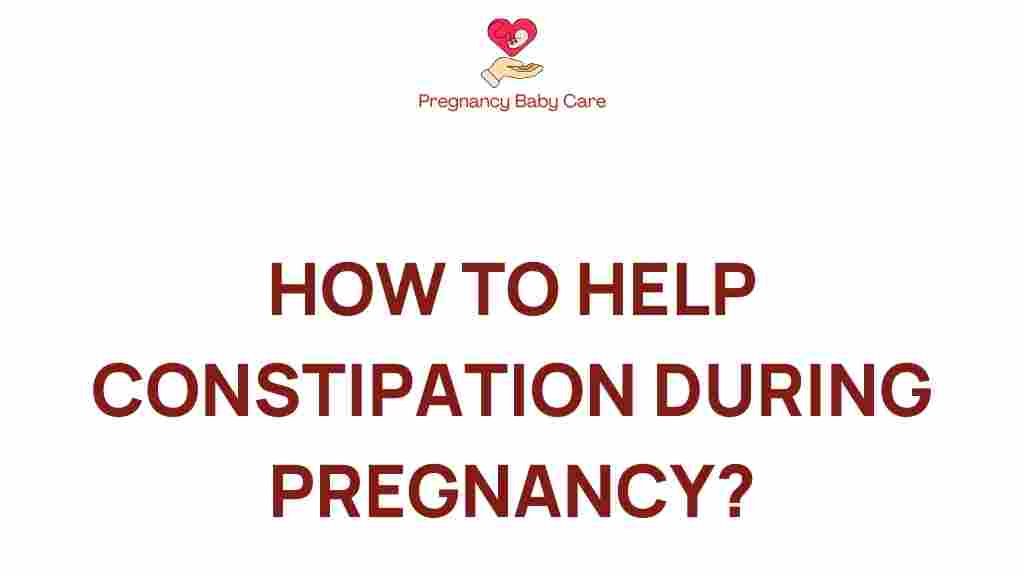Unraveling Constipation: Essential Tips for Expecting Mothers
Constipation is a common issue during pregnancy, impacting many women as their bodies undergo significant changes. As an expecting mother, maintaining digestive health is crucial not only for your comfort but also for your overall maternal health. In this article, we will explore effective strategies for managing constipation, including the importance of fiber intake, proper hydration, and natural remedies that can help you navigate this challenge during your prenatal care journey.
Understanding Constipation in Pregnancy
Constipation during pregnancy can be attributed to various factors, including hormonal changes, dietary adjustments, and the physical pressure of the growing uterus on the intestines. Understanding these factors can help you address and alleviate the discomfort associated with this common condition.
- Hormonal Changes: Increased levels of progesterone can relax the muscles of the intestines, slowing down digestion.
- Dietary Changes: Pregnant women often alter their diets, which may lead to reduced fiber intake and digestive disturbances.
- Physical Pressure: As the uterus expands, it can put pressure on the intestines, making it harder to pass stool.
The Importance of Fiber Intake
One of the most effective ways to combat constipation is by increasing your fiber intake. Fiber adds bulk to your stool and helps it move through the digestive system more easily. Here are some tips for incorporating more fiber into your diet:
- Choose Whole Grains: Opt for whole grain bread, brown rice, and oats instead of refined grains.
- Fruits and Vegetables: Aim for a colorful variety of fruits and vegetables, such as apples, pears, broccoli, and carrots.
- Legumes: Beans, lentils, and peas are excellent sources of fiber and can easily be added to soups and salads.
- Nuts and Seeds: Snack on almonds, chia seeds, or flaxseeds for an added fiber boost.
As you increase your fiber intake, it’s essential to do so gradually to prevent gas and bloating. Aim for at least 25-30 grams of fiber per day.
Staying Hydrated
Proper hydration plays a crucial role in maintaining digestive health. Drinking enough fluids helps soften stool and promotes regular bowel movements. Here are some hydration tips:
- Drink Water: Aim for at least 8-10 glasses of water per day. Carry a water bottle with you to ensure you stay hydrated.
- Include Hydrating Foods: Incorporate fruits and vegetables with high water content, such as cucumbers, watermelon, and oranges.
- Avoid Excess Caffeine: Limit caffeinated beverages, as they can contribute to dehydration.
Natural Remedies for Constipation
In addition to dietary changes, several natural remedies can help alleviate constipation during pregnancy:
- Warm Water with Lemon: Starting your day with a glass of warm water mixed with lemon juice can stimulate digestion.
- Prune Juice: Drinking prune juice or eating prunes is a time-tested remedy for promoting bowel regularity.
- Physical Activity: Gentle exercises such as walking, prenatal yoga, or swimming can help stimulate bowel movements.
- Probiotics: Consider incorporating probiotic-rich foods, like yogurt or kefir, to support gut health.
Step-by-Step Process to Manage Constipation
Managing constipation during pregnancy can be approached in a structured way:
- Evaluate Your Diet: Start by assessing your current fiber intake and identify areas for improvement.
- Increase Fiber Gradually: Slowly incorporate more high-fiber foods into your meals to avoid discomfort.
- Stay Hydrated: Make it a point to drink water throughout the day and include hydrating foods in your diet.
- Establish a Routine: Try to set aside time each day for a bowel movement, as routine can help your body adjust.
- Try Natural Remedies: Experiment with natural remedies and see which ones work best for you.
- Stay Active: Incorporate gentle physical activity into your daily routine to stimulate digestion.
Troubleshooting Tips for Constipation
If you find that constipation persists despite your efforts, consider these troubleshooting tips:
- Consult Your Healthcare Provider: Always discuss any ongoing issues with your doctor to rule out underlying conditions.
- Evaluate Medication: Some prenatal vitamins and medications can contribute to constipation. Discuss alternatives with your healthcare provider.
- Monitor Stress Levels: High stress can affect digestion; consider relaxation techniques like meditation or deep breathing.
Conclusion
Constipation during pregnancy can be uncomfortable, but with the right prenatal care and proactive measures, you can manage the symptoms effectively. Focus on increasing your fiber intake, staying hydrated, and incorporating natural remedies into your routine. Remember that every pregnancy is unique, so be sure to consult your healthcare provider for personalized advice tailored to your specific situation.
By prioritizing your women’s wellness and maintaining a healthy digestive system, you can enjoy your pregnancy journey to the fullest. If you’re looking for more information on pregnancy wellness, check out this resource on maternal health.
For additional support on natural remedies and dietary tips, visit this comprehensive guide to enhancing digestive health during pregnancy.
This article is in the category Pregnancy and created by PregnancyBabyCare Team
